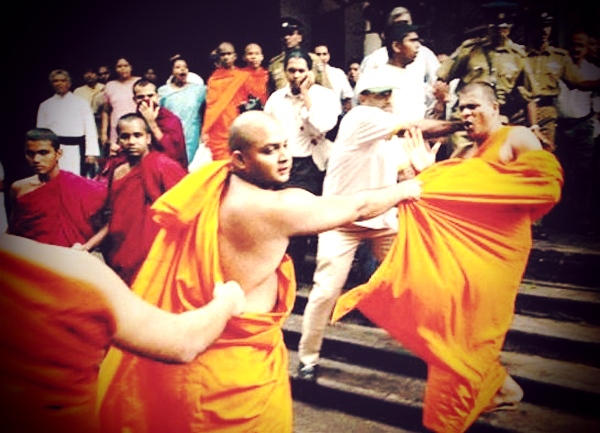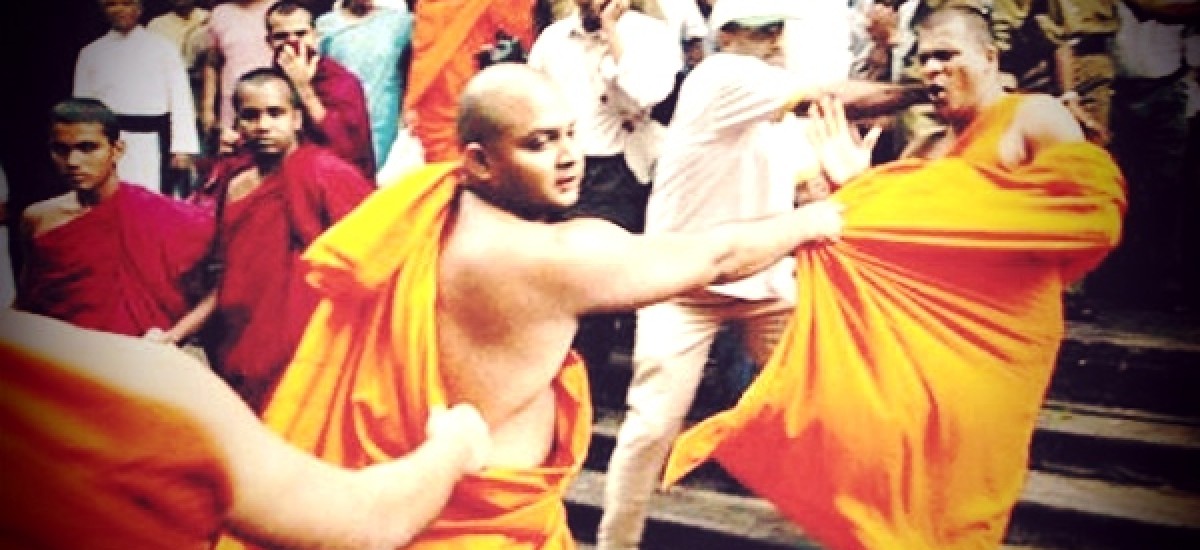
Image credit NowPublic
Spirituality
The desire for the triumph of good over evil is an inherent human spiritual need and consequently it is the underlying theme of all religious teachings. It is a universally accepted truth that the propagation of good leads to happiness while the propagation of evil leads to suffering. The concept of Good can be defined as human thoughts, words and deeds which benefit and sustain the physical, emotional, intellectual and spiritual wellbeing of humanity without compromising all other life and non life which supports and sustains human survival. It follows that the definition of Evil is the exact opposite of Good.
A feature common to all religions is the personification of good and evil primarily through icons such as God and the Devil portrayed as super natural beings. The purpose of it could be that personification of abstract concepts serves to facilitate better understanding of same. Religious belief is further reinforced by unique faith based doctrines and rituals built around religious icons, myths, legends and history distinctive to peoples, cultures and regions of the world.
Since the advent of the scientific method, there has been a growing trend towards reason based spirituality, particularly, in privileged sections of society. Reason based spirituality can be defined as the understanding of the concepts of good and evil and its impact on humanity based on logical reasoning. According to Maslow’s hierarchy of needs, man’s needs start with satisfying physical needs followed by emotional needs then by intellectual needs and finally by spiritual needs. The power of reasoning which comes with intellectual maturity leads to a greater emphasis on reason based spirituality. In contrast, people who have not yet achieved intellectual maturity find faith based spirituality more comforting as it provides hope for supernatural intervention when human intervention is not forthcoming in addressing their basic needs. Faith can be defined as the unquestioning acceptance of religious doctrine which identifies God, a divine power as the source of all good and the devil, a supernatural being as the source of all evil.
Religion
Is organized religion too compartmentalized through rigid doctrine and rituals which serve to divide rather than harmonize the common spirituality of man? If so, who is responsible for this? Are religious authorities guilty of over emphasizing differences in doctrine while underplaying common spiritual values? Religions survive mainly by advocating the supremacy of their own doctrines. Competing for supremacy can corrupt religious authorities. History is replete with evidence to this effect.
Man’s primeval need for belief in the supernatural can be attributed to his apparently isolated state in the universe, inability to physically identify a Creator and due to lack of understanding of the role and purpose of humanity. When man lacks rational explanations for such profound issues, he tends to turn to the supernatural which can fill the void easily through faith based religious doctrine.
Consequently, the spirituality of man is in a constant state of tension between reason based as spirituality versus faith based spirituality. Faith based spirituality has a greater influence on society as it is strongly backed by religious advocacy. Thus it is evident that man’s appeal to the supernatural in seeking spiritual solace can be easily exploited through the influence of organized religion which is pervasive at all levels of society. Many progressive countries have opted to do away with religious education in schools in order to promote reason based spirituality which has a harmonizing effect compared to faith based spirituality.
Islam and Social control
The practice of Islam in the Arab world provides a striking example of the use of religion to control society in several ways, the most obvious being the strict dress code, particularly for women. Laws which infringe on a person’s fundamental rights such as dress code, public display of emotions, sexual relations and blasphemy laws based on Islam are embedded in the constitutions governing most Islamic countries. Punishments prescribed for any violations of faith based laws are generally extreme and inhumane as they are highly anarchronistic such as stoning to death, cutting off limbs and ‘eye for an eye’ type punishment. Consequently, the fanatical practice of religion can have a detrimental impact on the basic freedoms of people.
Buddhist Nationalism and ethnic conflict
In Sri Lanka, we can also see the negative impact of nationalizing Buddhism as a state religion and the obligation of the state to give it primacy of place over all other religions and foster its practice as required by the Constitution. The politicization of Buddhism favours the majority Sinhalese as it happens to be practiced only by Sinhalese in Sri Lanka and therefore marginalizes all other ethnic/religious minorities, particularly the largest minority group, the Tamils which has contributed to the ethnic conflict. Although the conflict culminated in a war resulting in the successful decimation of the extremist terrorist movement by the state, it has given rise to fanatical Buddhist supremacy which is intolerant of other creeds.
Hinduism and Caste discrimination
Hinduism is a ancient religion based largely on myths and legends which serve to define the universal principle of the triumph of good over evil. A serious flaw is its anachronistic belief in the archaic Caste based classification of society which has unfortunately endured over the centuries and also has been transmitted to Sri Lanka and currently practiced by both the Buddhist clergy through caste based sects as well as covertly by its followers in the social context. Despite suffering the epic tragedy of the Tsunami, it was common knowledge that many ‘higher caste’ Sinhalese victims were not prepared to re locate their homes close to those of ‘lower caste’ victims which was an even greater tragedy. In fact, many believed that the fisher caste community were most severely impacted by the Tsunami as punishment or ‘karma’ for practicing a trade of killing fish which is considered immoral according to Buddhism. Hypocritically, it is not considered unethical to consume fish and meat according to Buddhist religious authorities.
The ethnic conflict can also be attributed, in part to, marginalization through caste discrimination within the Tamil community resulting in the impoverishment and consequent frustration of many, particularly the youth. This was one of the reasons for the extremists who largely represented the impoverished ‘lower castes’ to be in conflict with the ‘high caste’ Tamil political leadership as they did not consider them their true representatives. Even after the war, we can see the unethical issue of Caste in the context of rehabilitation and re settlement. ‘Higher caste’ Tamils continue to covertly resist in assisting impoverished war victims who are predominantly ‘lower caste’ in re settling in ‘higher caste’ neighbour hoods or admitting such children into ‘higher caste’ schools. Unless and until ‘higher caste’ Tamils accept Caste as an unethical practice, the impoverished and marginalized in their community cannot hope for justice and equity provided through legitimate means and may thus seek redress through illegitimate extremist methods as attempted in the past. Ironically, Tamil Christian religious leaders have always empathized with the Tamil marginalized classes and consequently were suspected as terrorist supporters.
Christianity, Evangelism and Conversions
Active Christian missionary work has been obnoxious to Buddhist religious leaders ever since colonial times Consequently, Buddhist religious authorities in Sri Lanka have always been suspicious of Christian evangelism due to many conversions from Buddhism to Christianity among the marginalized classes. Consequently, the state is seriously considering an anti conversion law “Bill for Prohibition of Forcible Conversions,” against the spread of Christianity. In this instance as well, Christian religious leaders have also empathized with Sinhalese Buddhist ‘lower caste’ communities resulting in many conversions to Christianity which has been criticized by Buddhist religious leaders as the spiritual manipulation of vulnerable social groups.
Conclusion
It is evident form the above analysis that religion plays a negative role in harmonizing the common spirituality of man. In fact, religion, throughout the ages has aggravated human conflict and imposed arbitrary control through stringent laws which have compromised fundamental human rights. Its requirement for unquestioning faith in the divine causes conflict in the minds of men who have been educated to think rationally and scientifically on all other issues. It is time that societies in the developing world are made aware of the divisive effects of organized religion and encouraged to turn towards reason based spirituality which has no vested interests and consequently far more ethical, moral and intellectually dignified in addressing man’s spiritual needs.
Sri Lanka, in particular, is the target of this article as a developing nation with a highly vulnerable society due to its endemic poverty, religious and ethnic diversity, a recently concluded brutal ethnic conflict, allegations of war crimes and the government’s unwillingness to investigate such a grave accusation which will have serious repercussions to the country.
There is a palpable need to break away from the organized religious shackles of Buddhist nationalism, Caste Hinduism, Christian Evangelism and Islamic fundamentalism not only in Sri Lanka but throughout the world . Countries which have religion embedded into their constitutions in order to establish religious supremacy need to re consider its validity for achieving national peace and stability. Buddhism is a religious philosophy which advocates personal salvation through ethical and moral conduct based on reason. Unfortunately, the custodians of Buddhism have reduced the philosophy to a religion which recognizes divine intervention in the form of deities and also by subscribing to numerous archaic rules and practices which are anathema to Buddhist philosophy. Unfortunately, the majority Sinhalese Buddhists are caught in a trap of deception and manipulation by vested interests to claim the supremacy of sinhala Buddhist nationalism by marginalizing the minority communities.
If we are to prosper as a united country, society needs to break away from divisive thinking based on narrow religious dogma. We need to extract the universally accepted values and principles embedded within archaic and anachronistic religious doctrines and rituals most of which are redundant and irrelevant due to the evolution of civilization to higher levels of thought and existence. For this, we need to exercise our powers of reasoning in addressing our spiritual needs which have a strong bearing on our mutual objective of striving for sustainable peace, justice and equitable prosperity in harmony with our environment.

